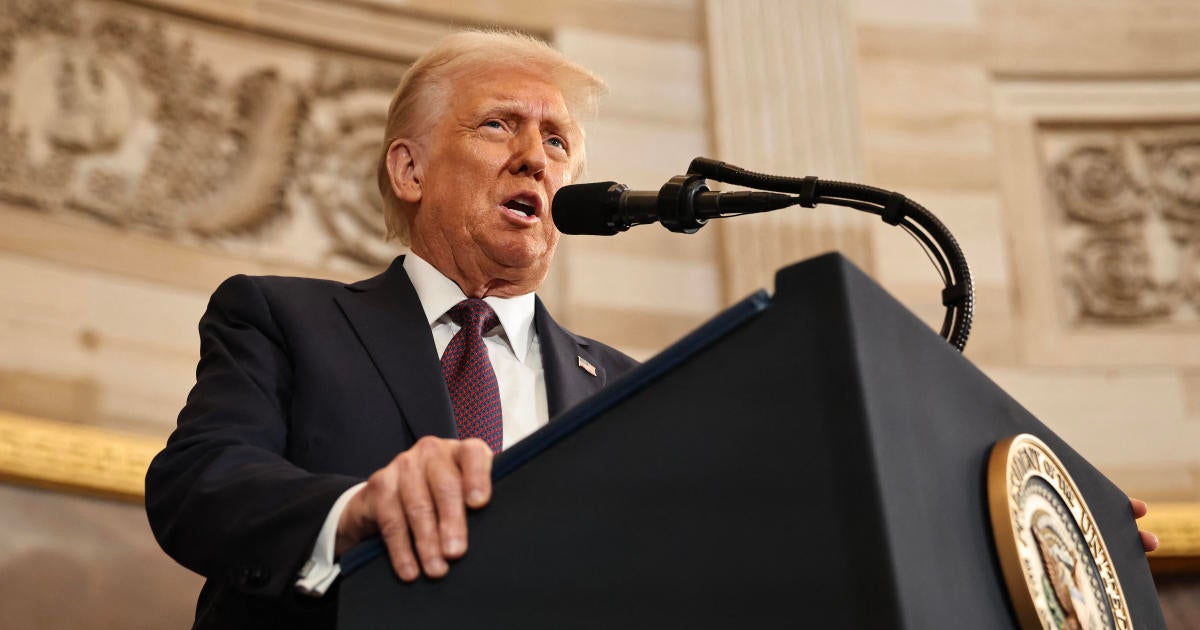President Trump is keeping his powder dry, at least for now, in deploying tariffs to advance his administration’s push to redefine trade relations with other major economies around the world.
Mr. Trump, who as president-elect said he could move to apply sweeping levies on foreign imports on his first day in office, stopped short of imposing so-called universal tariffs or directly targeting China, which he had threatened to hit with 60% duties.
Instead, Mr. Trump said Monday that his administration is considering 25% tariffs on Canada and Mexico as soon as Feb. 1 unless they take stronger measures to stop the flow of unauthorized migrants and and illicit drugs flowing into the U.S.
“We’re thinking in terms of 25% on Mexico and Canada, because they’re allowing vast numbers of people — Canada’s a very bad abuser also — vast numbers of people to come in, and fentanyl to come in,” Mr. Trump said Monday as he signed a range of executive orders on his first day in office addressing the American economy, immigration, energy policy and other areas.
When asked about his plans for blanket tariffs on U.S. imports, Mr. Trump said they remain a possibility, but “we’re not ready for that yet.” As a candidate during the 2024 presidential campaign, he proposed across-the-board tariffs of 10% to 20% on all U.S. imports.
In his inaugural address Monday, Mr. Trump said that “instead of taxing our citizens to enrich other countries, we will tariff and tax foreign countries to enrich our citizens,” although he didn’t offer any specifics.
In a memorandum on Monday, Mr. Trump also called for a review of existing U.S. trade agreements and asked for recommendations on how the U.S. can gain leverage with trading partners.
Said Mr. Trump in the memo: “I am establishing a robust and reinvigorated trade policy that promotes investment and productivity, enhances our nation’s industrial and technological advantages, defends our economic and national security, and — above all — benefits American workers, manufacturers, farmers, ranchers, entrepreneurs and businesses.”
Winding road on trade
Initially, analysts now expect the Trump administration to implement tariffs incrementally. Economists have warned that steep tariffs could boost inflation and slow economic growth. Mr. Trump has long argued that tariffs deployed during his first term didn’t boost inflation and that raising costs on foreign imports can help protect U.S. jobs.
“In short, the road to tariff implementation might be less straightforward than a universal tariff baseline might imply, given the potential for moving targets around scope and scale,” Morgan Stanley analysts said Monday in a report.
But other experts said they still expect the Trump administration to eventually adopt a universal tariff, noting that the new regime is examining whether to create what it calls an External Revenue Service to collect tariff revenue. That suggest the “administration intends for some tariffs to be permanent,” Stephen Brown, deputy chief North America economist with Capital Economics, told investors in a research note.
Retaliation risk
Meanwhile, any actions by the U.S. to subject other countries to new tariffs would likely spur retaliation, experts say. Canadian Prime Minister Justin Trudeau promised a sharp response to any new levies, saying in a news conference in Ottawa on Tuesday that “everything” was now on the table,” according to AFP.
In November, Canadian government official said it was exploring potential retaliatory tariffs on certain U.S. imports after Mr. Trump, then the president-elect, threatened a 25% tariff on all goods from Canada and Mexico.
A 25% U.S. tariff on Canadian imports would likely drive up inflation in Canada and push it into a recession in 2025, according to econmist Michael Davenport Oxford Economics. The country’s auto, energy and heavy manufacturing industries, which rely on exports to the U.S., would feel the greatest impact since those sectors also depend on components from American suppliers, he noted.
The U.S. would also feel the impact of a trade war with Canada, according to experts. Universal tariffs on American products would likely cause a “shallow” recession in the U.S., according to Oxford.
Canada also supplies roughly 20% of the oil used stateside. As a result, U.S. gas prices could shoot up 30 to 40 cents a gallon, and potentially up to 70 cents, soon after Trump levied tariffs on Canada, Patrick De Haan, head of petroleum analysis at GasBuddy, has told CBS MoneyWatch.

